– The historical significance of Smokey Bear in wildlife conservation and fire prevention
– An in-depth look into the strategic campaign behind Smokey Bear’s creation and its impact over the years
– The role of zoology and zoo management in contemporary wildlife conservation efforts
– Celebrating Smokey Bear’s 80th birthday: achievements and future directions for the campaign
– The connection between educational initiatives and long-term environmental stewardship
—
Few figures are as iconic or have had as enduring an impact in the annals of wildlife conservation and environmental education as Smokey Bear. August marks the 80th birthday of this beloved character, whose inception sprang not from folklore but from the very real necessity of preventing human-caused wildfires. This milestone provides a critical juncture to reflect on the importance of conservation messaging, the advancements in zoology and zoo management, and how these arenas contribute to the broader objectives of maintaining biodiversity and promoting sustainable interaction with natural environments.
Smokey Bear’s journey began in the 1940s as part of a concerted effort by the United States government to address the rampant issue of wildfires, a significant number of which were caused by careless human actions. This period also saw the burgeoning of zoo management and zoology as scientific fields committed to understanding animal behavior, ecology, and physiology in tandem with conservation efforts to preserve species and their habitats. Creating Smokey Bear was a strategic move, utilizing a relatable and authoritative character to articulate the message that “Only YOU can prevent forest fires.” This slogan, alongside Smokey’s image, quickly permeated American culture, showcasing the power of well-crafted educational campaigns in altering public behavior for environmental good.
The strategy behind Smokey Bear’s popularity was multifaceted. By anthropomorphizing a bear—a creature known for its strength and authority in the animal kingdom—creators tapped into a deep-seated reverence for and curiosity about wildlife. This strategic choice not only fostered an emotional connection with the audience but also helped to make the message memorable. Zoology and zoo management, disciplines dedicated to the study and preservation of animals, underpin the scientific understanding that informs conservation campaigns like Smokey Bear’s. These fields provide valuable insights into the behaviors and needs of wildlife, highlighting the importance of protecting natural habitats from preventable threats such as wildfires.
Celebrating Smokey Bear’s 80th birthday invites a reflection on the campaign’s achievements, notably its role in decreasing the incidence of preventable wildfires and increasing public engagement with environmental stewardship. Over the years, the message has evolved to adapt to new understandings and challenges within environmental conservation, proving the campaign’s flexibility and enduring relevance. Zoology and zoo management professionals contribute to this evolution by offering expertise on wildlife behavior and habitat requirements, ensuring that conservation messages remain scientifically accurate and effective.
Moreover, the connection between educational initiatives like the Smokey Bear campaign and long-term environmental stewardship cannot be overstated. Education plays a pivotal role in shaping attitudes and behaviors toward the environment. By instilling a sense of responsibility and providing actionable advice, campaigns such as Smokey Bear’s nurture a culture of conservation. In parallel, zoology and zoo management have shifted towards more interactive and educational models. They use their platforms to raise awareness about conservation issues and engage the public in meaningful dialogue about sustainable practices.
As we commemorate Smokey Bear’s 80th birthday, it is crucial to recognize the broader implications of this milestone for wildlife conservation and environmental education. The success of Smokey Bear’s campaign underscores the importance of strategic communication in effecting change. Looking forward, the principles that have guided Smokey Bear’s message for eight decades remain as relevant as ever. With ongoing challenges such as climate change and habitat destruction posing ever-present threats to wildlife, effective conservation messaging and public engagement in environmental stewardship is paramount.
In light of these considerations, the legacy of Smokey Bear’s campaign exemplifies how strategic educational initiatives, grounded in scientific understanding and public engagement, can achieve lasting impacts on conservation efforts. As professionals in zoology and zoo management continue to advance their fields, they do so with the knowledge that their work contributes to a larger narrative of conservation and sustainability—one that Smokey Bear has been a part of for 80 years and will continue to influence for generations to come.
*****
Source Description
Join us for this bear-y special Agent Briefing! This year, Smokey Bear turns 80 years old! Although Smokey’s birthday is not until August, the USDA Forest Service is celebrating this event all year long! They have teamed up with Agents of Discovery to provide you with an incredible Smokey-themed mission! To share more about Smokey Bear and his upcoming birthday, we have Tonee Davis from the USDA Forest Service! You won’t to miss this stream and mission!
You can play this incredible mission now! It’s totally FREE and this year it’s available in both English and Spanish.Open the Agents of Discovery app and search for the Smokey Bear’s 80th Birthday Mission in your state.
Para la versión en español descarga la aplicación “Agents of Discovery” y busca la misión “Misión del 80 cumpleaños de Smokey Bear”


